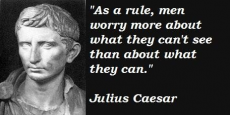
In considering the failure of the Roman Republic R.E. Smith argues that the Republic’s failure was a ‘crisis and failure of society’. Though he does not specifically contribute to the debate over Caesar’s assassination, Smith considers that the Roman people lost all sight of the oligarchical structure of the Republic, indeed ‘a society is more than the individuals who compose it’ and from perhaps the late 2nd Century BC onwards the Roman Republic had begun to lose a grip on its origins and the purpose of its structure. Man is greedy and never was there a better example of individuals over and above the collective than the competition for Dignitas and Gloria of the Roman Republic; it just took a few hundred years before the ambitious nobles were able to muster their own armies and act as ‘warlords’. Though some of the senators may have truly believed they were liberating the republic of a tyrant, ultimately with hindsight we can see that the Republic fell apart into a power struggle after Caesar’s death before ultimately becoming a true autocracy under Augustus. Perhaps Cassius knew this to be the outcome and perhaps many of the senators involved did also, ultimately the roman nobles did not liberate the republic, they condemned it.
In conclusion of this intriguing discussion, we must reiterate once again that there can be no sole motive attributed to Caesar’s assassination because the sheer number of senators involved and their differing personas cannot all be confined under one assumption. This paper has, however, set about considering whether one motive might have taken precedence over all others for the majority of the assassins. With the benefit of hindsight, a decent understanding of the importance of class and family in roman society and the use of our plethora of primary sources, (with particular attention to Cicero’s enlightening letters to the assassins) this paper concludes that although mainstream thought considers the assassins to have marshalled under Brutus’ name to respect his legacy and overthrow a tyrannical king, the overriding reason for Caesar’s assassination was that he held too much power. Note that this is different from acting as Rex, Caesar might have been a benefit to the Republic despite the label he is given for destroying it, but because he hindered ambitious nobles below him, he had to be removed. The opposition Caesar could not see nor conquer by the end of his shining career was that undying sense of Roman competition for dignitas and gloria both as a Republic and amongst the nobility, neither of which could flourish underneath a sole dictator.
I hope you've enjoyed my articles explaining my argument on why the great Julius Caesar was assassinated by the very men he had worked with, fought beside and even pardoned. Perhaps the key thing to learn is that it is important to consult lots of literature when studying the Ancient World because it is very subjective and ultimately we cannot be sure of the truth.
IMAGE: http://www.wordsonimages.com/pics/55097-o.jpg

0 Comment:
Be the first one to comment on this article.